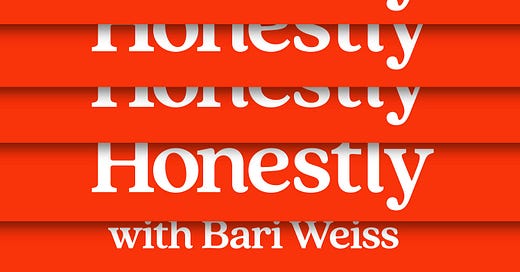On Tuesday night, president-elect Donald Trump announced that the richest man in the world, Elon Musk, along with entrepreneur Vivek Ramaswamy will head a new initiative in the Trump administration: the Department of Government Efficiency, or “DOGE.”
Aside from the very strange fact that internet meme culture has now landed in the White House—Dogecoin is a memecoin—more importantly, what the announcement solidifies is the triumph of the counter-elite. A bunch of oddball outsiders ran against an insular band of out-of-touch elites supported by every celebrity in Hollywood—and they won. And they are about to reshape not just the government but also the culture in ways we can’t imagine.
And there was one person I wanted to discuss it with. He is the vanguard of those antiestablishment counter-elites: Peter Thiel. People describe the billionaire venture capitalist in very colorful terms. He’s been called the most successful tech investor in the world. A political kingmaker. The bogeyman of the left. The center of gravity in Silicon Valley. There’s the “Thielverse,” “Thielbucks,” and “Thielists.” To say he has an obsessive cult following would be an understatement.
If you listened to my last conversation with Thiel a year and a half ago on Honestly, you’ll remember that Peter was the first guy in Silicon Valley to publicly embrace Trump in 2016. That year, he gave a memorable speech at the RNC, and many in his orbit thought it was simply a step too far. He lost business at Y Combinator, the start-up incubator where he was a partner. Many prominent tech leaders criticized him publicly, like VC and Twitter investor Chris Sacca, who called Thiel’s endorsement of Trump “one of the most dangerous things” he had ever seen.
Well, a lot has changed since then. For one, Thiel has taken a step back from politics—at least publicly. He didn’t donate to Trump’s 2024 campaign. There was no big RNC speech this year. But the bigger change is a cultural one. He’s no longer the pariah of Silicon Valley for supporting Trump.
On the surface, Thiel is someone who seems full of contradictions. He is a libertarian who has found common cause with nationalists and populists. He likes investing in companies that have the ability to become monopolies, and yet Trump’s White House wants to break up Big Tech. He is a gay American immigrant, but he hates identity politics and the culture wars. He pays people to drop out of college, but, in this conversation at least, still seems to venerate the way that the Ivy Leagues are an indicator of intelligence.
But perhaps that’s the secret to his success: He’s beholden to no tribe but himself, no ideology but his own. And why wouldn’t you be when you make so many winning bets? From co-founding the e-payment behemoth PayPal and the data analytics firm Palantir (which was used to find Osama bin Laden) to being the first outside investor in Facebook, Thiel’s investments—in companies like LinkedIn, Palantir, and SpaceX, to name a few—have paid off big time.
His most recent bet—helping his mentee J.D. Vance get elected as senator and then on the Trump ticket as vice president—seems also to have paid off. The next four years will determine just how high Thiel’s profit margin will be.
Today: Thiel explains why so many of his peers have finally come around to Trump; why he thinks Kamala—and liberalism more broadly—lost the election; and why the Trump 2.0 team will be better than last time, with antiestablishment figures who are willing to rethink the system. We talk about the border, trade deals, student debt, Israel and foreign policy, the rise of historical revisionism, the blurry line between skepticism and conspiracy, and his contrarian ideas about what we might face in a dreaded World War III.
Go to groundnews.com/Honestly to get 50% off the unlimited access Vantage plan and unlock world-wide perspectives on today’s biggest news stories.
Learn more about your ad choices. Visit megaphone.fm/adchoices














Bari: Not as impressed with Peter Thiel as you are!
His "not at all" response to your question on whether he is worried that Trump has burned through the A,B, and C lists, Thiel messed up big time! It appears that Trump is now reaching out to the Z-list.
On the issue of scientists losing healthy skepticism, it turns out that in physics a result is not deem a discovery until it hits the "5-sigma" mark. That is, in order to claim a discovery, there is only a 1 in 3.5 million chance that the observed result is due to random fluctuations rather than a real effect. I hope that Thiel demands similar standards on "vaccines causing autism".
Bari - come on. You still don't listen. You need to dig in and evaluate DJT and the new MAGA coalition for yourself! As a journalist, I'd think that was necessary. Pointing out that the "smart people" around Trump in his first administration did not do him any favors. He has openly said he did not expect to win and he had to accept the Republican administrations' hand picks. They were out to thwart Trump and he was much less effective than he will be this time. And he actually has the will and strength to fire people who don't perform!
To fixate on "Trump's character" - "he churns though people" that work with him. No, he doesn't. He has an extreme phalanx of loyal people. Many of whom go to prison for him. Look at the loyalty he is showing RFK; Tulsi, et al. To fixate on an off-the-cuff (and off the record) comment he made in 2005 (and apologized for in 2016 when it was brought out to embarrass him). So short-sighted. And please, don't trot out the "felon 34 times over". The "ledger" entry for a single payment multiplied x 34. That payment influenced the 2016 election? Really? Does anyone believe that? The entire situation did not influence the 2024 election (except to allow more people to see the political law fare going on).
Please do us a favor, as the figurehead of TFP. Please, do some evaluation of the primary sources on DJT.
Rather than writing off all Trump voters as captured by personality and showmanship, consider that many of us (I'd say most of us) are intelligent, thoughtful people who have been watching and researching these primary sources since sometime in 2016. We see the things you can't seem to.